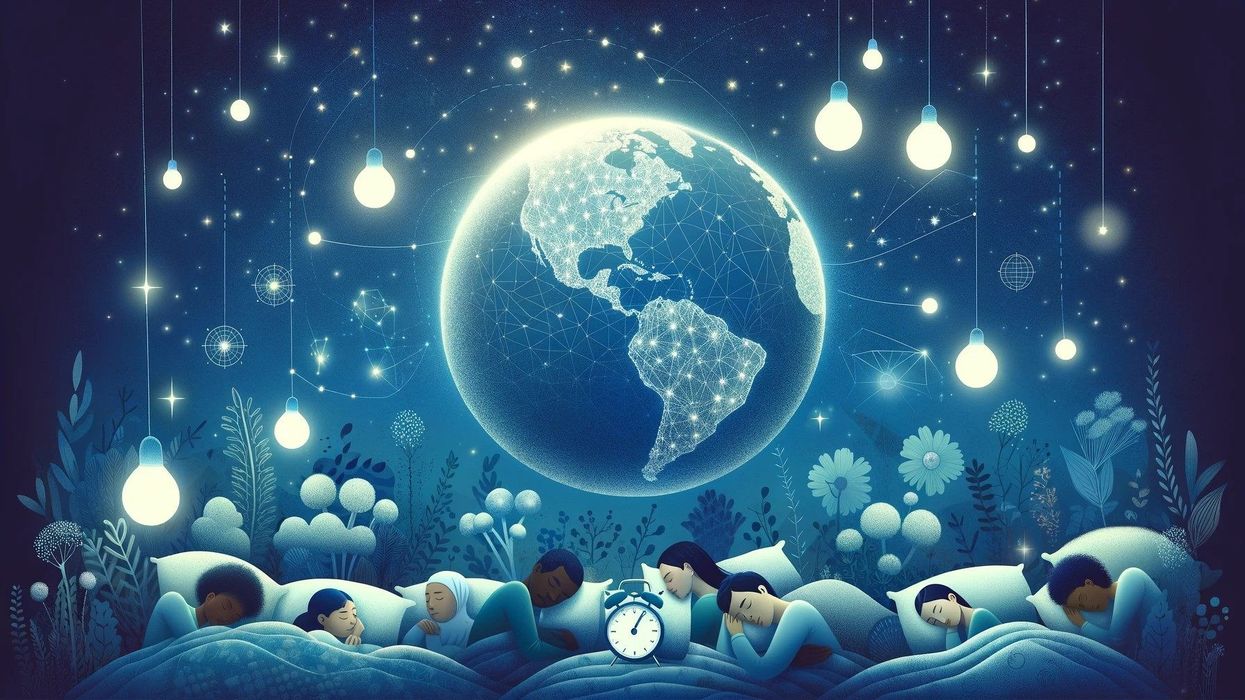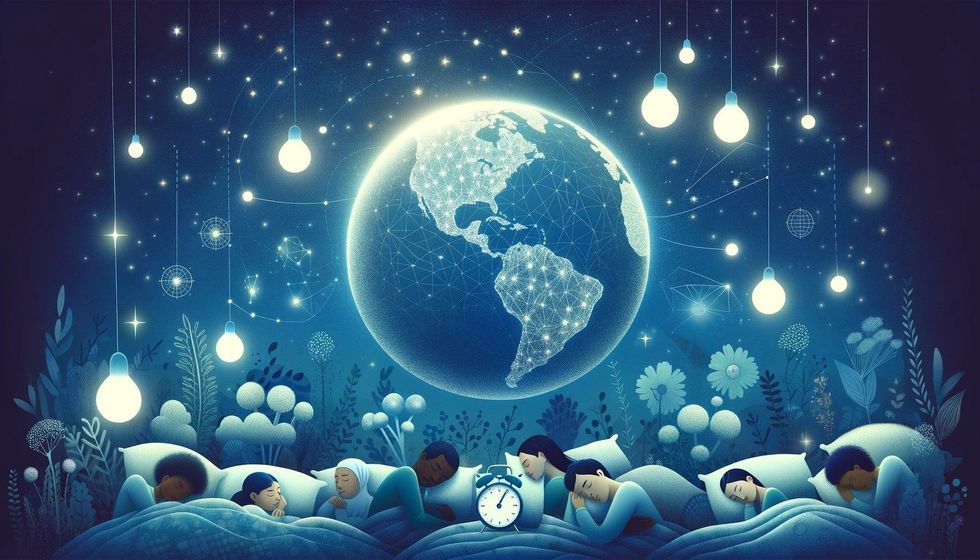World Sleep Day
March 15, 2024
Location: Worldwide
The Friday before the March Equinox marks a special occasion not celebrated with fanfare but observed with quiet reflection and a collective commitment to health. It's World Sleep Day, an annual event dedicated to the benefits of restful sleep.
World Sleep Day serves as a global call to action on issues relating to sleep, including medicine, education, social aspects, and driving. Organized by the World Sleep Society, the day is a paramount reminder of the essential component of daily human lives often sacrificed at the altar of busyness: sleep.
As the spring vernal equinox approaches, night and day are often said to be equal in length, serving as nature's symbol of balance, an equilibrium we strive for in our sleep patterns.
On this particular day, sleep professionals and sleep health advocates champion the cause of sleep medicine, address the pervasive ripple effects of sleep deprivation, and emphasize the pursuit of better sleep for improved health and life quality.
Where is World Sleep Day celebrated?
World Sleep Day invites participation from across the globe, with sleep equity as a central theme. It captivates the attention of sleep health advocates, medical experts, and those dedicated to wellness, fostering a worldwide dialogue. The observance bridges communities from different continents, rallying both the medical sector and everyday people around the vision of amplified sleep awareness and education.
In its inclusive approach, World Sleep Day ensures the conversation about sleep science and its pivotal effects on well-being continues to persist. It champions the significance of restorative rest, emphasizing its necessity in everyday existence and striving for equitable access to sleep health for all.
Who is World Sleep Day celebrated by?

World Sleep Day is honored by an extensive network including the World Sleep Society, sleep professionals and researchers, healthcare practitioners, and every individual who recognizes the indispensable role of healthy sleep as the foundation of well-being.
The day brings together a confluence of experts dedicated to fostering a greater understanding of sleep science and sleep health advocates committed to spreading knowledge in the public sphere.
It also resonates with people seeking to optimize their own slumber, understanding that rest is a fundamental pillar of physical and mental health, as crucial as diet and exercise. This collective engagement underscores the universal acknowledgment that sleep, when embraced as a priority, can dramatically enhance life’s quality and vitality.
When did World Sleep Day first start?
In 2008, the World Sleep Day Committee established this observance as a permanent annual event on the health awareness calendar, marking a new era in the public's recognition of sleep health.
This initiative was conceived to not only highlight the importance of sleep but to catalyze a worldwide conversational movement focused on improving sleep habits and understanding sleep's pivotal role in health.
Since its inception, World Sleep Day has consistently illuminated human understanding of sleep, emphasizing research, education, and advocacy year after year to create a global impact on well-being. Through these efforts, the committee has successfully shone a persistent light on sleep issues, transforming how societies worldwide view and prioritize rest.
Who started World Sleep Day?
The World Sleep Day Committee, comprised of a committed union of sleep health advocates and professionals, was instrumental in bringing World Sleep Day into existence, doing so with the endorsement and support of the World Sleep Society.
This collaboration was motivated by a shared desire to enhance the public's understanding of sleep's critical role in health and to mobilize resources and expertise toward this common goal.
The committee's founding of this day has since created a global movement, uniting efforts to address the often-overlooked challenges of achieving restorative sleep and combating sleep disorders. Their ongoing dedication continues to spotlight the essential, albeit sometimes undervalued, aspect of human health: the profound impact of sleep on overall well-being.
History And Timeline

Trace the defining moments of World Sleep Day as you explore its inception and the global awakening brought about by this important observance.
Timeline Item 1
Date: 2008
Heading: Inaugural Sleep Day
Summary: World Sleep Day was first organized by the World Sleep Society to highlight the importance of sleep in achieving an optimal quality of life and global health.
Timeline Item 2
Date: Yearly Recurrence
Heading: Rhythms Of Awareness
Summary: Each year, this day synchronizes with the rhythms of the spring vernal equinox, symbolizing balance and renewal, both of which are key to good sleep health.
Timeline Item 3
Date: Yearly Recurrence
Heading: Focus On Sleep
Summary: World Sleep Day focuses each year on various themes to raise awareness about sleep's critical role and address common sleep issues affecting millions globally.
Timeline Item 4
Date: 2012
Heading: "Breathe Easily, Sleep Well"
Summary: The theme for World Sleep Day in 2012 focused on sleep apnea, a condition where breathing stops and starts during sleep. This theme aimed to raise awareness about the condition, emphasizing the importance of recognizing and treating sleep disorders for uninterrupted, quality sleep.
Timeline Item 5
Date: 2015
Heading: "When Sleep is Sound, Health and Happiness Abound"
Summary: The 2015 World Sleep Day highlighted the holistic benefits of sound sleep. Through this theme, the World Sleep Society sought to underline how good sleep contributes to overall health, happiness, and well-being, stressing that quality sleep is foundational to a joyful and healthy life.
Timeline Item 6
Date: 2017
Heading: "Sleep Soundly, Nurture Life"
Summary: This theme centered on the importance of sleep in nurturing life. It aimed to educate people on how quality sleep can improve life and protect mental health, increase life span, and enhance the quality of life. The focus was on practical tips to improve sleep hygiene and create a better sleep environment.
Timeline Item 7
Date: 2019
Heading: "Healthy Sleep, Healthy Aging"
Summary: The theme for 2019 was a call to action to recognize and preserve the natural rhythms of sleep. It served as a reminder of the significance of maintaining a natural rhythm in sync with the body's internal clock for enhancing life quality. This theme also highlighted the adverse effects of modern lifestyle choices on sleep patterns.
Timeline Item 8
Date: 2021
Heading: "Regular Sleep, Healthy Future"
Summary: Emphasizing the future aspect of health, this theme in 2021 aimed to promote regular sleep as a route to a healthy future. It focused on educating people about the importance of maintaining regular sleep patterns to fight the global epidemic of sleep disorders and to improve overall health outcomes in the long term.
Timeline Item 9
Date: 2023
Heading: "Sleep is Essential for Health"
Summary: This recent theme reiterates sleep's essential role in maintaining health. It emphasizes that sleep should be considered as important as diet and exercise in health regimens. The message is clear: prioritizing sleep is non-negotiable for achieving and maintaining optimal health.
Traditions And Customs
World Sleep Day is marked by a series of educational events, public campaigns, and academic discussions, all aimed at sharing knowledge about sleep health. Activities often include sleep habit workshops, free sleep screenings, and the prevalence of sleep medicine advancements.
Ways To Observe World Sleep Day

To engage with World Sleep Day, consider conducting a personal sleep assessment, participating in community advocacy for sleep health, or even volunteering your time with organizations that raise awareness of sleep disorders.
World Sleep Day Facts And Stats
- Established by the World Sleep Society, World Sleep Day has occurred annually since 2008, aligning with the Friday before the Spring Vernal Equinox, to advocate for the significance of proper sleep.
- Notably, over 88 countries, including Thailand, Sri Lanka, Armenia, Portugal, Nigeria, Morocco, and India partake in hosting educational and awareness events, and diverse initiatives relevant to World Sleep Day.
- World Sleep Day 2024 emphasizes "Sleep Equity for Global Health," spotlighting sleep's role in wellness and the necessity for universally accessible sleep healthcare resources.
World Sleep Day FAQs
Why is sleep so important?
Sleep is crucial for various aspects of health and well-being. It helps in repairing the body, consolidating memories, regulating emotions, and managing stress. Adequate sleep is associated with reduced risks of chronic conditions like obesity, diabetes, cardiovascular diseases, and mental health disorders. On a lighter note, it also saves you from being the grumpy person at breakfast!
How does World Sleep Day impact public health?
By emphasizing sleep health, the event empowers individuals to make informed choices, addressing sleep deprivation and its consequences.
What are some common sleep disorders?
Common sleep disorders include insomnia (difficulty falling or staying asleep), sleep apnea (breathing interruptions during sleep), restless legs syndrome (uncomfortable sensations in the legs with a compulsive urge to move them), and narcolepsy (excessive daytime sleepiness). These conditions can significantly impact quality of life, but with proper diagnosis and treatment, they can be managed effectively.
What is the role of the World Sleep Society in World Sleep Day?
The World Sleep Society leads in organizing the event, offering resources and support to spread knowledge about sleep health globally.
Any tips for better sleep?

Health professionals advise that you stick to a consistent sleep schedule, ensure your bedroom is quiet, dark, and at a comfortable temperature, and avoid heavy meals, caffeine, and alcohol before bedtime. Also, engaging in regular physical activity during the day can promote better sleep at night.
Remember, creating a pre-sleep ritual like reading or taking a warm bath can signal your body it's time to wind down.
What's a fun fact about sleep?
Did you know that before the invention of color TV, most people dreamed in black and white? Studies have shown that the prevalence of color dreaming increased significantly after color broadcasts became widespread. This fun fact highlights the fascinating ways in which technology and culture can influence your subconscious mind!
Where can I learn more about improving my sleep?
For more information on enhancing your sleep, visit reputable health and wellness websites, consult with sleep specialists, or check out resources provided by the World Sleep Society and other organizations dedicated to sleep research and education. Remember, investing in your sleep is investing in your health.
Follow World Sleep Day On Social Media
Twitter Hashtag: #WorldSleepDay #WorldSleepDay2024 #CelebrateSleep #sleep #health #WSD2024
Instagram Hashtag: #WorldSleepDay #BalanceForBetter #WorldSleepDay2024 #worldsleep #worldsleepsociety #healthysleep #CelebrateSleep #sleep #sleepequity
When is this day celebrated?
- 03/15/2024, Friday
- 03/14/2025, Friday
- 03/13/2026, Friday
- 03/19/2027, Friday
- 03/17/2028, Friday
In essence, World Sleep Day transcends its role as a date on the calendar, embodying an enduring dedication to enhancing global well-being by advocating for the importance of healthy sleep.
Spearheaded by the World Sleep Society and observed by communities everywhere, this occasion serves as a platform for reflection, education, and collective action. It aims to cement the notion that quality sleep should be an accessible and integral part of daily life, not a mere indulgence.
As you observe World Sleep Day, you're reminded to uphold the value of rest, ensuring that the momentum for sleep health persists through every silent night, reiterating sleep's crucial contribution to your ongoing vitality.
We Want Your Photos!
More for You
Bachelor of Science in Mathematics & Computer Science

Ijeoma AsuohaBachelor of Science in Mathematics & Computer Science
Ijeoma is a passionate mathematics and computer science graduate with a penchant for problem-solving and education. Growing up in a large family, she developed a strong sense of responsibility and a love for nurturing young minds. Driven by her natural inclination, Ijeoma often found herself tutoring and mentoring her little cousins and nephews, and She discovered a deep satisfaction in witnessing their growth. Her interactions with her family members sparked a desire to pursue a career where she could combine her technical expertise with her passion for education. Inspired by Kidadl's mission to empower young learners through engaging content, Ijeoma is eager to contribute her skills and knowledge to the team. With her background in mathematics and computer science, coupled with her nurturing nature and teaching experience, she aspires to create impactful educational resources that spark curiosity and inspire learning in children worldwide.
Disclaimer
1) Kidadl is independent and to make our service free to you the reader we are supported by advertising. We hope you love our recommendations for products and services! What we suggest is selected independently by the Kidadl team. If you purchase using the Buy Now button we may earn a small commission. This does not influence our choices. Prices are correct and items are available at the time the article was published but we cannot guarantee that on the time of reading. Please note that Kidadl is a participant in the Amazon Services LLC Associates Program, an affiliate advertising program designed to provide a means for sites to earn advertising fees by advertising and linking to Amazon. We also link to other websites, but are not responsible for their content.
2) At Kidadl, we strive to recommend the very best activities and events. We will always aim to give you accurate information at the date of publication - however, information does change, so it’s important you do your own research, double-check and make the decision that is right for your family. We recognise that not all activities and ideas are appropriate for all children and families or in all circumstances. Our recommended activities are based on age but these are a guide. We recommend that these ideas are used as inspiration, that ideas are undertaken with appropriate adult supervision, and that each adult uses their own discretion and knowledge of their children to consider the safety and suitability. Kidadl cannot accept liability for the execution of these ideas, and parental supervision is advised at all times, as safety is paramount. Anyone using the information provided by Kidadl does so at their own risk and we can not accept liability if things go wrong.
3) Because we are an educational resource, we have quotes and facts about a range of historical and modern figures. We do not endorse the actions of or rhetoric of all the people included in these collections, but we think they are important for growing minds to learn about under the guidance of parents or guardians.







